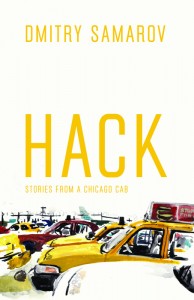 Here’s a blog-to-book deal I’ve been quite taken with ever since I discovered it–and I often mention it when I’m out speaking. Dmitry Smarov began his blog, Hack: Stories From a Chicago Cab, about six years ago. Each entry relates encounters with a memorable passenger or situation at the garage and each includes an original illustration (either drawn or painted). The book of the same name, published by Chicago University Press, is organized into the days of the week to give the reader a sense of a cabdriver’s work schedule and is illustrated throughout, though not for each anecdote as is done on the blog. The writing in the book collects the best of what appeared in the blog up to July 4th, 2010.
Here’s a blog-to-book deal I’ve been quite taken with ever since I discovered it–and I often mention it when I’m out speaking. Dmitry Smarov began his blog, Hack: Stories From a Chicago Cab, about six years ago. Each entry relates encounters with a memorable passenger or situation at the garage and each includes an original illustration (either drawn or painted). The book of the same name, published by Chicago University Press, is organized into the days of the week to give the reader a sense of a cabdriver’s work schedule and is illustrated throughout, though not for each anecdote as is done on the blog. The writing in the book collects the best of what appeared in the blog up to July 4th, 2010.
According to Samarov, “There was a lot of editing done to the pieces chosen. Many readers’ input was taken into account before the manuscript went to press. It took about a year and a half at the end of which we had a little book we could all be proud of. The editing and re-editing made me into a much better writer.”
1. Why did you begin blogging?
I needed a means of relating some of the experiences that were happening from day to day as I drove a cab around Chicago. I’d done a ‘zine in 2000 that told of my experiences driving a cab in Boston in the ‘90s and it was called “Hack” because in Boston a license to drive a cab was called a hackney carriage license and a “hack” was what they used to call a cabdriver in the old days. I revived the name for the blog but unlike the ‘zine, which was mostly pictures with fairly minimal writing, the prose took a more central role. The picture that starts each entry still serves as a way into the writing for me because I started, and remain, primarily a visual artist, but with time I found my voice in words and continue to work at it to this day.
2. How did you choose your topic?
It chose me. I never had any ambition to write but there was no way that I could show what I saw in the cab strictly through pictures. The daily parade of personalities that got in and out of the back seat demanded to be recorded, so I did my best to accommodate.
3. What, if any, market research did you do before beginning your blog?
None at all. None after it started either. The idea of making money from my writing never crossed my mind.
4. Did you think you were writing a book, did you plan on blogging a book or were you simply blogging on your topic? (In retrospect, would doing one or the other have made it easier to later write your book?)
No, not at all. I was just trying to tell about what I saw the best I could. There’s no way to tell whether doing things another way would’ve been easier because this was my first blog and also my first book. It’s all I know and I’ve never been one to speculate and wonder about what might’ve been. Planning’s rarely been part of my creative output; I work from life, reacting to it rather than setting out with any particular goal to achieve.
5. How long did it take for you to gain blog readers and can you pin point any certain event that created a tipping point when readership increased noticeably?
Less than a year into it the blog somehow attracted the attention of a few local publications, most notably the Chicago Reader. Whet Moser, who was then the web editor there, wrote about Hack often, even naming it best local blog one year, and that did a lot to get it on people’s radar.
6. What did you do to drive traffic (readers) to your blog?
I have a mailing list which I use any time anything new is finished—be it artwork or writing. I am also on Twitter and spread the word that way.
7. How did your blog-to-book deal come about?
In 2008, I made a ‘zine compiling the best of the first few years of the blog. I gave a copy to John Hodgman, who was a high school classmate of mine, and he thought enough of it to recommend it in the pages of a magazine called “The Week.” Levi Stahl, who works in the publicity department at the University of Chicago Press, read that piece and contacted me for a copy of the ‘zine. A few months later he emailed me to say that he was planning to pitch my blog as a book idea to his employers. Soon after that I had a book deal.
8. What one or two things that you did would you attribute to your blogging success (and to the book deal you landed)?
I’ve always kept it to firsthand experience and was lucky enough to write about a world most people don’t know much about. There was never any calculation or strategy involved, so I don’t know that it was anything that I consciously did that got me a book deal.
9. What advice would you give to writers wanting to blog a book (and build readership/platform while doing so)?
Just write if you’ve got something to say. I have no clue how to “build readership” any of that. If what you’re doing is worthwhile it will find an audience sooner or later. Don’t force it down people’s throats.
10. What process did you use to find or choose the blog posts that went into your book? (And out of how many posts did you have to choose?) How did you then organize them, or did you keep the flow that you originally constructed?
I had about seventy-five posts to work with, and I probably ended up using about sixty, though in some cases I only used parts of the originals. It took a while to settle on a structure for the book. The trouble was that there was really no through-line or narrative, no beginning, middle, and end to these anecdotes and, unlike the blog, which developed without an over-arching shape, the book certainly needed one. I was conscious of not wanting to judge print out pages of the blog and put a binding around it. It seems to me that many blog-to-book projects are quickie cash-in jobs—an attempt to squeeze out what one can out of a flash-in-the-pan. These little sensations, which the internet is full of, disappear as fast as they appear; I wanted to make something that might last. One of the first schemes I came up with was a thematic one, so all the drunk stories were one chapter, all the cab breakdowns another, etc. But an early reader of that version told me that it was too much of the same grouped together, so I had to come up with something else. I settled on the days of the week, and that wound up conveying both the randomness and the order of a cabbie’s worklife. Some posts explicitly stated what day they took place on, others were more vague, but through re-reading them and remembering I was able to cobble together a whole week out of some four years of randomly-recorded days.
11. What kind of editing did you need to do to make the blog posts work in a book? Did you need to add transitions, revise for flow from one post to the next, rewrite because of the different timeline, etc.?
Most of the editing was cosmetic—adding a word here, changing one there—but in some pieces the whole tense they were written in had to be changed, in others only a part made sense in the new context of the book, so whole chunks were jettisoned. I added minimal transitions here and there, like the short introductions at the beginning of each chapter, but for the most part I wanted the content to have come from the original experiences so the vast majority of the writing came from the blog. It was just shaped and spit-shined into a new form.
12. You mention that you took your readers input into account before the manuscript went to press. What do you mean by this? How exactly did their comments affect the final version of the book?
The readers I mean were mostly ones that the University of Chicago Press provided but also a few close friends as well. I don’t mean that readers of the blog were solicited. The two people that read and re-read the thing most though were my editor and my copyeditor. They made many suggestion based on their years dealing with manuscripts that were indispensable. You have to remember that I never went to school for writing so there were many technical aspects of the process that I was just ignorant of.
13. You say the editing and re-editing made you into a much better writer. Explain in what way, and did it also make you a better blogger (and how)?
I’ve always just written phrase to phrase. I still do, but after going through this year-and-a-half editing process, I have a better sense of the whole piece of writing I’m working on. The editors rid me of a few persistent bad habits like the over-reliance on ellipses as a transitional device and my refusal, early on, to use personal pronouns.
14. what advice would you offer to aspiring writers who might want to turn their blogs into books?
Confine the writing to one aspect of your life like your job or the one activity you devote all your spare time to. This way when you start thinking about turning what you’ve written into a book you’ll at least be dealing with material that’s all in the same ballpark. If your interests are so many that you can’t imagine winnowing them down, start a separate blog for each and see which one demands most of your time. One is sure to win out over the rest.
Focus on the actual writing rather than the goals or dreams you might achieve with the award-winning masterpiece you envision. It’ll likely never happen if it’s what you’re going for.
About the Author
 Dmitry Samarov, born 1970 in Moscow, USSR…immigrated to the US, 1978…attended Parsons School of Design, School of Art Institute, Chicago, 1989 to 1993…attended Indiana University, 1994…currently work as a cab driver…that’s all folks.
Dmitry Samarov, born 1970 in Moscow, USSR…immigrated to the US, 1978…attended Parsons School of Design, School of Art Institute, Chicago, 1989 to 1993…attended Indiana University, 1994…currently work as a cab driver…that’s all folks.
|
|

Leave a Reply